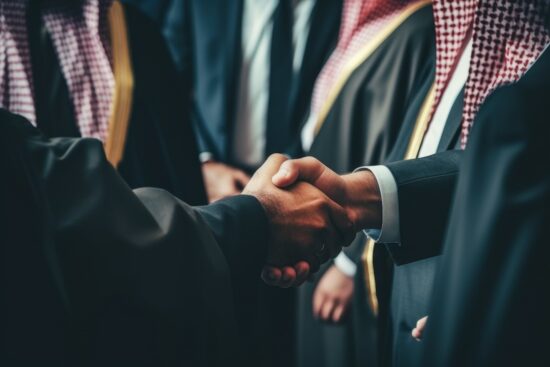The Middle East, with its complex geopolitical landscape, has always been a focal point of global diplomacy. Arab states, comprising a diverse set of nations with unique historical, cultural, and economic backgrounds, play a critical role in shaping international relations. From brokering peace deals to participating in multilateral discussions that impact global security and economic stability, Arab states have gradually carved a position for themselves in the intricate web of world diplomacy. Within this environment, Shawn Romer, who practiced law for 12 years, analyzes the strategies that Arab states adopt and the challenges they face.
Historical Context and Evolution
Arab states have long been influential in global diplomatic arenas, primarily due to their strategic geographic positioning and the wealth of natural resources. The discovery of oil in the early 20th century marked a significant shift, catapulting many Gulf states into the center of global economic interest. However, this newfound economic leverage also came with an increased expectation to contribute to international stability. Over the decades, Arab states have evolved from passive participants to active negotiators in global forums. Their involvement in institutions like the United Nations and the Arab League has allowed them to voice regional concerns and advocate for their interests on an international scale.
Economic Diplomacy as a Tool for Influence
One of the key aspects of Arab diplomatic efforts lies in their economic diplomacy. The wealth generated from oil has provided these nations with significant soft power, enabling them to build partnerships and investments worldwide. This economic influence is wielded to secure strategic alliances and foster development initiatives in regions far beyond their borders. Initiatives such as financial assistance programs for developing countries, investments in technology and infrastructure, and support for global humanitarian projects reflect how Arab states use their economic might to strengthen their diplomatic reach.
Peace Initiatives and Mediation Efforts
Arab nations have also been crucial in mediating regional and international conflicts. For example, countries like Qatar have been known to act as intermediaries in peace negotiations, leveraging their neutral stance to facilitate dialogues between conflicting parties. The 2020 Abraham Accords, which saw normalization agreements between Israel and several Arab states, underscored a transformative moment in Middle Eastern diplomacy. These accords not only highlighted a willingness to shift traditional narratives but also showcased the potential of Arab states to foster peace and stability in the region and beyond.
Challenges Facing Arab Diplomacy
Despite these efforts, Arab states face significant challenges in their diplomatic endeavors. One prominent issue is the internal diversity of the Arab world itself. Countries within the region differ widely in terms of economic strength, political structures, and social dynamics, leading to varied approaches to foreign policy. These differences can sometimes result in disunity and conflicting stances on global matters, complicating collective efforts to present a unified front in international negotiations.
Another major challenge is the geopolitical tensions that frequently arise within and around the Middle East. Conflicts such as the Israeli-Palestinian dispute and the power dynamics involving Iran pose continuous threats to regional stability. These tensions often extend beyond regional boundaries, drawing in global powers and complicating Arab states’ ability to act as neutral mediators. Furthermore, the influence of external players like the United States, Russia, and China can overshadow or complicate diplomatic initiatives led by Arab nations, impacting their autonomy on the global stage.
Opportunities for Greater Influence
Amid these challenges, there are significant opportunities for Arab states to expand their influence. The global pivot toward renewable energy presents an avenue for Arab states to diversify their economic and diplomatic strategies. By investing in clean energy technologies and partnerships, these countries can position themselves as leaders in the transition to sustainable energy solutions. This shift could enhance their diplomatic capital and reshape their relationships with other global powers that are also prioritizing sustainability.
Additionally, the Arab world’s rich cultural heritage can be a powerful diplomatic tool. Initiatives that promote cultural exchanges, educational partnerships, and international tourism can foster greater understanding and build positive relationships with other nations. Cultural diplomacy can serve as a bridge for collaboration and dialogue, reinforcing the notion that diplomacy is not just about political negotiations but also about fostering human connections.
The Role of Regional and International Partnerships
Collaboration among Arab states and with international partners is essential for navigating complex global issues such as climate change, economic fluctuations, and international security. The Gulf Cooperation Council (GCC) is an example of a regional organization that aims to foster collective action among its member states. While the GCC has seen its share of challenges, including internal disagreements, it continues to be a platform through which member states can address shared concerns and coordinate responses to regional and global events.
Internationally, partnerships with global powers remain crucial. Strategic relationships with the European Union, the United States, and China play a significant role in shaping the diplomatic landscape for Arab nations. These partnerships can bring economic benefits and bolster security arrangements, yet they must be managed carefully to avoid becoming overly reliant on any one power, which could limit diplomatic independence.
Future Prospects and Strategic Moves
As the world continues to grapple with rapid technological advancements, shifting economic priorities, and evolving political alliances, Arab states have an opportunity to assert themselves as influential players on the global stage. Diversification of economic strategies, increased investment in innovation, and a focus on fostering unity within the Arab world are essential for leveraging their full potential in global diplomacy. The focus on collaborative approaches and strategic partnerships will be critical for addressing global challenges and enhancing the influence of Arab states in international affairs.
Arab states are at a crossroads where they must balance longstanding traditions with modern diplomatic approaches. By embracing both their rich history and the possibilities offered by modernity, these nations can continue to shape not only their future but also contribute to a more stable and interconnected global community.
